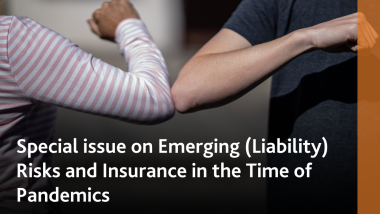Insurance relationships are fundamentally built on trust between insurers and their customers. Customers trust that insurers will act in ways that ensure their solvency and that they will promptly pay claims when they are due; insurers in turn trust that policyholders will make sure to minimise their risk after signing a policy and that any claims they make will be genuine. Certain shifts such as digitalisation, however, may pose a threat to customer trust as concerns around data privacy, misuse of information and bias or discrimination arise. A better understanding of the factors that underpin customer confidence as well as ways to maintain it is therefore highly relevant for insurers.
The October 2021 special issue of The Geneva Papers on Risk and Insurance, guest edited by Luigi Guiso, is dedicated to the topic of trust in insurance, with articles on the relationship between levels of societal trust and insurers’ risk-taking strategies, the use of transparency to gain or retain customer trust, and the impact of digitalisation on the importance of traditional policyholder risk declarations.
In Societal trust, risk avoidance and corporate risk taking: evidence from the global insurance industry, Tao Sun explores the link between two sociocultural factors – societal trust and risk avoidance – and insurer risk taking. Country-level trust and risk avoidance variables are constructed based on responses from the World Value Survey, which explores people's values and beliefs and how they change over time, and covers almost 100 countries. The results reveal that insurers adopt riskier strategies in countries that show higher levels of societal trust, which the author proposes is due to a reduction in information asymmetry between consumers and insurance firms. These findings may be of particular interest to insurers operating in multiple geographies.
The article by Jacob Dexe, Ulrik Franke and Alexander Rad, Transparency and insurance professionals: a study of Swedish insurance practice attitudes and future development, investigates whether insurer transparency around the use of new artificial intelligence (AI) technologies can help to avoid a loss or reduction in customer trust. To do so, they circulated a questionnaire and surveyed 71 insurance professionals in Sweden. The findings reveal that most of the companies represented do not currently use transparency in a strategic manner. Though there was widespread belief among the respondents that transparency may offer a competitive advantage, there was a lack of consensus on how insurers should go about using it in practice. The majority agreed that more understandable policies would be a good first step, but also highlighted the difficulties of making complex AI algorithms comprehensible. Legal requirements and the risk of disclosing models to competitors were also identified as limitations.
The final article by Marta Ostrowska, Does new technology put an end to policyholder risk declaration? The impact of digitalisation on insurance relationships, examines how the data obtained from digital technologies is affecting insurers’ risk assessment processes and the implications this has for traditional risk declarations in insurance contracts. The paper argues that although the use of data from Internet of Things (IoT) devices, wearables and telematics may allow insurers to offer more personalised products to customers, it also shifts the balance of information asymmetry away from policyholders and towards insurers. Whether this manifests as an elimination of imbalance between the parties or to an increase in imbalance to the detriment of the policyholder remains to be seen, but it will have implications for the future relevance of policyholder risk declarations and will determine whether traditional aspects of insurance contracts will become obsolete or should be redefined for the digital era.
In addition to these three papers on trust in insurance, the special issue also includes the following non-thematic articles:
- Non-life insurance cancellation: a systematic quantitative literature review by Manuel Leiria, Nelson Matos and Efigénio Rebelo.
- Does economic policy uncertainty matter for insurance development? Evidence from 16 OECD countries by Nguyen Phuc Canh, Udomsak Wongchoti and Su Dinh Thanh
- Information access and homeowners insurance purchases by Richard J. Butler
- Reinsurance, debt capacity and financial flexibility by Xiaoyi Li and Yung-Ming Shiu
- Life insurance companies’ investment abroad and the internal rate of return on Chilean annuities by Cristian Escudero and José L. Ruiz
- Diversification and efficiency of life insurers in China and India by Lei Peng and Zhaotong Lian








